STEM is boring …or is it?
Published on Tuesday, 04 July 2017
Last updated on Thursday, 22 October 2020

By Heike Schneider, Little Scientists Australia.
Do you think science is difficult and boring, and wonder if anyone would ever explore science just for the fun of it?
You know what – I used to! When I think back to my school years filled of maths, chemistry and physics …oh my, it was dreadful. I recall endless lectures, scary formulas and so many terms and expressions I did not understand. Instead of engaging in scientific exploration, I was put off.
In 2004, I graduated and was finally liberated from these painful school experiences and was convinced I would never be interested in science ever again! Well, life takes funny turns sometimes. Fast forward 10 years and I find myself working for Little Scientists Australia, a not-for-profit organisation that offers professional development workshops in STEM* to early childhood professionals, in other words: science, science, science. And, I'm loving it!
Since graduating from school, I have come to realise; my rejection of the topic science had nothing to do with me. Sadly though, this doesn’t change the reality that I missed out and never entered the amazing world of STEM exploration as a student.
Back then most of my teachers lectured, explained, and demonstrated. As the student, I was expected to passively absorb and reproduce the correct information and answers. This teacher-centred approach was much more prevalent back then and is unfortunately still existing. Luckily, positive long-term changes in STEM teaching are on the horizon! The number of teachers with an inquiry-based teaching approach and the aim to amplify children's natural curiosity for scientific exploration (instead of killing it) is constantly growing.
Instead of talking academia, let me give you a real-life example of this empowering change. This example from KU Mayfield in Newcastle demonstrates wonderfully that STEM does not have to be passive or unengaging, but the very opposite:
Picture a group of 5-year old children in the garden, engaged in what might look like playing with paper planes. But is in fact so much more. These children are working together on a research project. The question that initiated the project was raised during play: How can we build a paper plane that flies the furthest? A group of children get excited about the idea, and a project with the objective to build the 'best paper plane' is initiated.
Over the course of several weeks, the children plan the project, hypothesise their outcomes and observe the results of their experiments. They face numerous set-backs and challenges.
Over time, some children leave the project team and others join in, for a while the project is on hold because they run out of ideas of improvements, and because they are distracted by jumping in the rain puddles… And one day, one of the children brings in a story book about this one fabulous paper plane – and suddenly the project is back to full speed. After weeks and weeks of research the children conclude: Many different things determine if a plane is better than another. Consequently, they decide to examine one specific variable and to see how much it affects the distance a plane can fly. A new question is waiting to be explored!
At a recent interview, Karen Hugo, Director at KU Mayfield, told me: 'Our paper plane project was a great experience because it showed us how much our children naturally love to engage in research projects. It is amazing to see what they can do when they are genuinely interested in a topic and when the learning is done by the children themselves, and we as educators are only there to facilitate their learning process. To see how far we could take this and how long they were interested in the project, was incredible.'
Karen also shared with me that KU Mayfield's participation in Little Scientists workshops has been very helpful in transforming the educators’ approach to daily exploration of STEM:
'The Little Scientists educational approach has really helped us to focus on the fun of scientific exploration. It has helped us to feel confident and great about sharing with the children that we don't know all the answers, but that we want to find out! And if something doesn't work we just laugh and try something else or look at the questions from a different angle. It has been very empowering for both the children and the educators to engage in this co-constructed learning approach!'
Now, what's my point? Well, I want to highlight that children are born with natural curiosity to explore the unknown. Anyone surrounded by young children knows the endless string of why-questions and these questions are the very first step of all scientific research.
Together, early childhood professionals can eliminate the old habits of boring science teaching. We can kick off the future of empowering STEM exploration, nurture inquisitive minds and build a platform for joyful STEM discovery that lasts a lifetime. What are we waiting for?
If you would like to find out more about Little Scientists Australia, please visit the website littlescientists.org.au or get in touch by email info@littlescientists.org.au
*Science, Technology, Engineering and Maths
Related Articles

A new and fun way for educators to teach young children STEM
New ideas for teaching young children about STEM (Science, Technology, Engineering, and Mathematics).

10 super fun STEM activities
Simple STEM activities are a fabulous opportunity to promote early interest in science and enquiry-based learning and it's never too young to start!

9 play-based science activities that build STEM skills
8 easy STEM ideas to try at home to boost learning through play based exploration and discovery.
